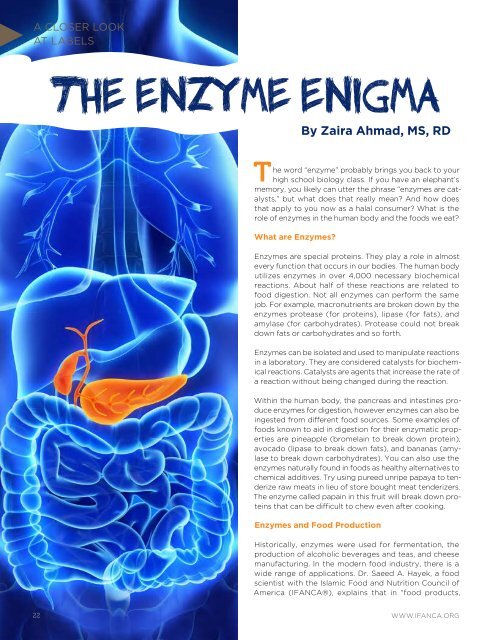You also want an ePaper? Increase the reach of your titles
YUMPU automatically turns print PDFs into web optimized ePapers that Google loves.
A CLOSER LOOK<br />
AT LABELS<br />
The Enzyme Enigma<br />
T<br />
By Zaira Ahmad, MS, RD<br />
he word “enzyme” probably brings you back to your<br />
high school biology class. If you have an elephant’s<br />
memory, you likely can utter the phrase “enzymes are catalysts,”<br />
but what does that really mean? And how does<br />
that apply to you now as a halal consumer? What is the<br />
role of enzymes in the human body and the foods we eat?<br />
What are Enzymes?<br />
Enzymes are special proteins. They play a role in almost<br />
every function that occurs in our bodies. The human body<br />
utilizes enzymes in over 4,000 necessary biochemical<br />
reactions. About half of these reactions are related to<br />
food digestion. Not all enzymes can perform the same<br />
job. For example, macronutrients are broken down by the<br />
enzymes protease (for proteins), lipase (for fats), and<br />
amylase (for carbohydrates). Protease could not break<br />
down fats or carbohydrates and so forth.<br />
Enzymes can be isolated and used to manipulate reactions<br />
in a laboratory. They are considered catalysts for biochemical<br />
reactions. Catalysts are agents that increase the rate of<br />
a reaction without being changed during the reaction.<br />
Within the human body, the pancreas and intestines produce<br />
enzymes for digestion, however enzymes can also be<br />
ingested from different food sources. Some examples of<br />
foods known to aid in digestion for their enzymatic properties<br />
are pineapple (bromelain to break down protein),<br />
avocado (lipase to break down fats), and bananas (amylase<br />
to break down carbohydrates). You can also use the<br />
enzymes naturally found in foods as healthy alternatives to<br />
chemical additives. Try using pureed unripe papaya to tenderize<br />
raw meats in lieu of store bought meat tenderizers.<br />
The enzyme called papain in this fruit will break down proteins<br />
that can be difficult to chew even after cooking.<br />
Enzymes and Food Production<br />
Historically, enzymes were used for fermentation, the<br />
production of alcoholic beverages and teas, and cheese<br />
manufacturing. In the modern food industry, there is a<br />
wide range of applications. Dr. Saeed A. Hayek, a food<br />
scientist with the Islamic Food and Nutrition Council of<br />
America (IFANCA®), explains that in “food products,<br />
22<br />
WWW.IFANCA.ORG


